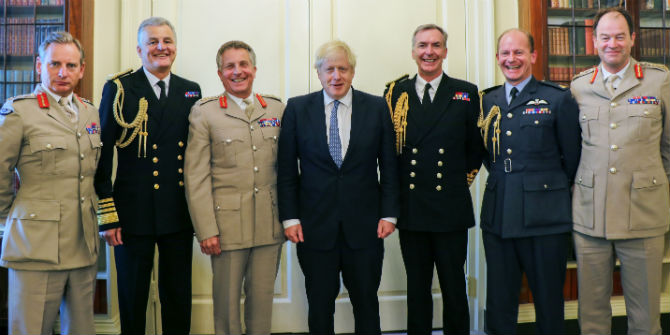The Elected Dictatorship
(or why those who do not learn the lessons of history are condemned to repeat them)

Many Progressives are coming to the conclusion that UK democracy is less than adequate due to Brexit and the majority’s inability post-2016 to influence the direction of our nations. Many more are becoming increasingly concerned about how the current Government is bending the unwritten rules of governance to accrue more power. For example, the attempt to prorogue Parliament, which was subsequently ruled illegal. Or the rapid accumulation of ‘Henry VIII powers’ allowing ministers to override statutory legislation and by-pass parliamentary scrutiny. Or their publicly stated willingness to break international law which continues to shock so many domestically and internationally.
How has this come about? Mainly because the UK’s system of representative democracy is poorly codified, having evolved over the years. We have moved from the Crown’s absolute power to a system of representative Parliamentary democracy in fits and starts. A triumvirate of Crown, Lords and Commons was intended to provide balance. Since the Bill of Rights of 1688, the Crown’s overarching power has been vested in Parliament. But what is increasingly forgotten is that this Parliamentary democracy was meant to function by the House of Lords and the House of Commons acting together. The powers of the House of Lords have gradually been eroded. It is now merely a revising chamber, a function which the Executive routinely over-rides.
The House of Commons’ role has also evolved, with the rise of formal political parties and through the whipping system. This reduces MPs from individual constituency representatives to lobby fodder, with careers dependent on their Executive – either the government or the Opposition front bench. And as the parties became more powerful, so did the Government of the day. A government with a Parliamentary majority and compliant backbenchers can do pretty much as it pleases. Other parties are reduced to ‘objecting’ to whatever the Government does.
This antagonistic approach makes for sterile posturing rather than genuine debate and – with Westminster elections held under FPTP – actively prevents new ideas and fresh faces from coming forward. The percentage of the population not voting for the Government is de facto not represented in any meaningful way. The Executive controls what is brought to Parliament and how much time is spent debating any topic. To this end, we have an 18th-century Parliamentary model running a 21st century UK.
In October 1976, 45 years ago, the barrister and former Conservative Lord Chancellor Quentin Hogg, Lord Hailsham (1907-2001) gave the BBC Dimbleby Lecture. He titled it The Elective Dictatorship, coining that phrase. These are his words, firstly on the power of Parliament. He maintained that the only limitations on such power are:-
‘… political and moral. They are found in the consciences of members, in the necessity for periodical elections, and in the so-called checks and balances inherent in the composition, structure and practice of Parliament itself.
Until recently, the powers of Government within Parliament were largely controlled either by the Opposition or by its own backbenchers. It is now largely in the hands of the government machine, so that the Government controls Parliament and not Parliament the Government. Until recently, debate and argument dominated the parliamentary scene. Now it is the Whips and the party caucus.
Not so long ago, influence was fairly evenly balanced between Government and opposition, and between frontbenches and backbenches. Today, the centre of gravity has moved decisively towards the government side of the House, and on that side to the members of the Government itself. The Opposition is gradually being reduced to Impotence, and the government majority, where power resides, is itself becoming a tool in the hands of the cabinet … The sovereignty of Parliament has increasingly become, in practice, the sovereignty of the Commons, and the sovereignty of the Commons has increasingly become the sovereignty of the Government, which, in addition to its influence in Parliament, controls the party whips, the party machine, and the civil service.
While before the election the manifesto is written rather in the style of an advertisement for patent medicine, after the election it is treated as a pronouncement from Sinai… The measures proposed in the manifesto often include the impossible, the irrelevant and the inappropriate. But it is here that the doctrine of the mandate takes over. However small the majority, however, ill-advised the promises, however controversial the programme, the party activists, flushed with victory, insistently demand the redemption of all the pledges in the shortest possible time, and they are vociferously egged on by the various pressure groups whose collective support has been won by the making of the pledges.
‘The electorate is itself markedly moderate in its views. But where the caucus is infiltrated, a few extremists have it in their power to deny them the right to vote for a moderate candidate’. (our emphasis)
This analysis illustrates that the majority government’s potential to seize power constitutionally has been with us for at least 45 years. There are no gentlemanly constraints in an amoral right-wing government. Several forces came together to execute this very British coup. British constitutional arrangements rely on ‘gentleman’s agreements – that decent chaps (and it’s always a chap) will play the game. Unwritten rules/custom and practice – call it what you will. Membership of an elite club with unwritten rules cannot be consulted, studied or learnt by outsiders.
There are no gentlemen in politics anymore. A new elite to that of the Crown or the aristocracy now rules us – a self-interested one. As we see daily, they accrue ever more power and wealth to themselves – as Lord Hailsham warned they could.
